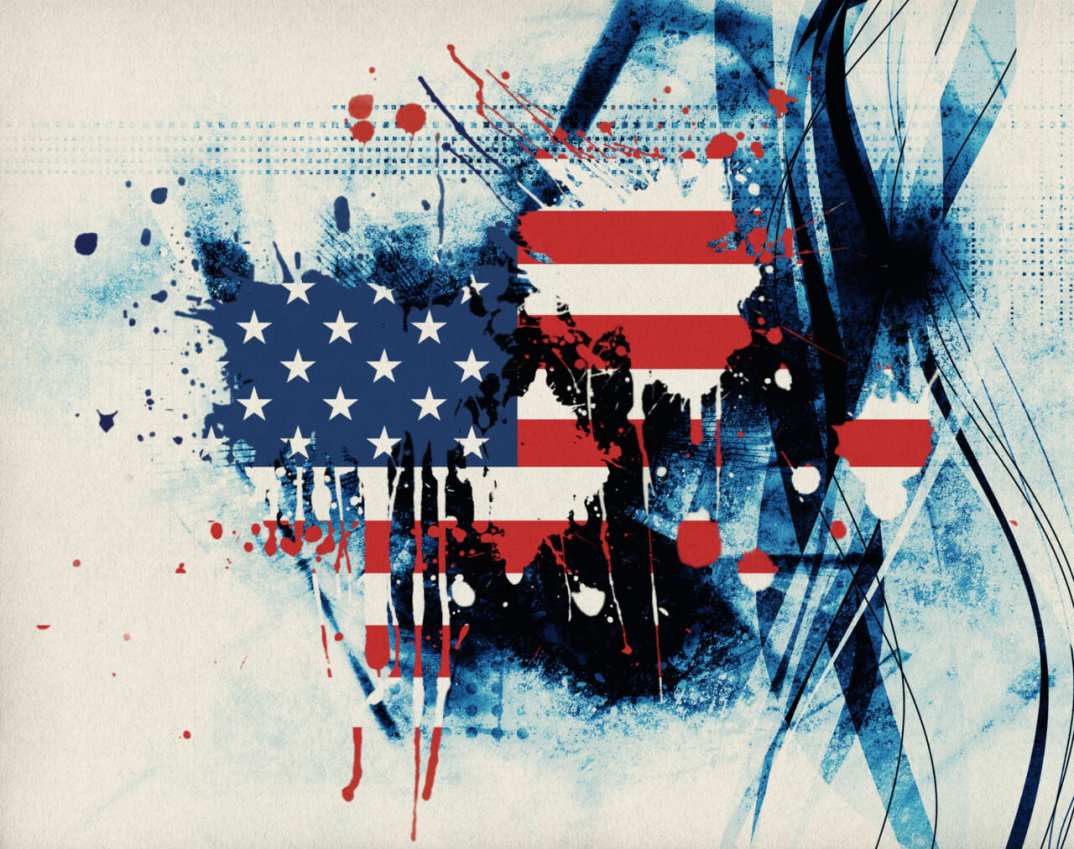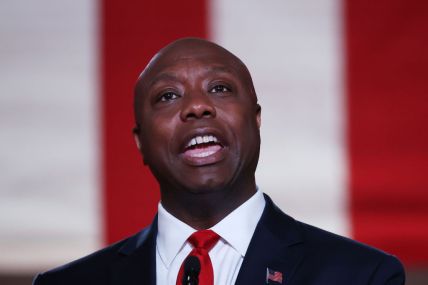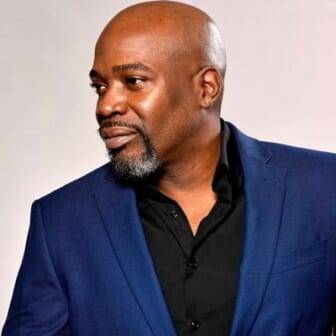America is an act of violence
OPINION: Whether it is a Supreme Court decision, a mob’s noose or a police officer’s gun, using violence to preserve white supremacy is a great American pastime. Trust me…you’ll get used to it.

Editor’s note: The following article is an op-ed, and the views expressed are the author’s own. Read more opinions on theGrio.
“Most people don’t like to fight,” said Bernard as his fist landed squarely in my solar plexus, leaving me unable to summon the oxygen to respond.
“I am most people,” I probably replied through the fog of juvenile early onset CTE. “‘Most people is me.”
Taking a boxing lesson from a 6-feet, 2-inch 17-year-old with a street name of “Big B” and a reputation for having “hands” was not my idea. But, since the entire clan of male Harriots was spending the summer at my aunt’s East Orange, N.J., home with no one to stop the older cousins from pummelling me and my younger cousins to pieces, there was nothing I could do. I once saw Big B knock out a grown man for stealing from the official neighborhood candy lady, Miss Betty Joe, and knew I would soon serve as his sentient punching bag for the entire summer.
As the sparring lesson continued, I realized that Big B was genuinely taking it easy on me. My 11-year-old toothpick legs wobbled while the audience of cousins offered sage advice like “don’t let him hit you” and “punch back!” Soon, each punch from his cement block-like hands swatted away a little more of my fear, and I began to swing wildly, trying to imitate the time I saw him knock someone out at Mr. Pendergrass’ corner store. After a while, I was comfortable that I landed a jab squarely on Big B’s face. Stunned, he put his hands down and smiled wryly.
“Stop trying to knock me out,” Bernard explained. “Calm down. You ain’t gonna win every fight; you just gotta let them know that you ain’t scared to fight. What did I just tell you?”
“Most people don’t like to—” I probably replied as he jabbed me in the face with a sucker punch. My cousin hit the bell (which was actually my aunt Jannie’s spaghetti pot), signaling the end of the round, and Big B started taking off his gloves and told me that was enough for today. I put my hand up and wheezed to my tutor:
“One more round.”
This story is about America.
According to Merriam-Webster, violence is:
- the use of physical force so as to injure, abuse, damage or destroy;
- injury by distortion, infringement, or profanation or
- An intense, turbulent, or furious and often destructive action or force.
I am consumed by thoughts of violence. While I do not condone it, I contemplate the meaning of the word and how we have accepted the notion that violence is the use of physical force and nothing else—no matter how destructive. In the American social structure, tweeting the n-word to someone is a protected act of free speech. Yet, slapping the taste out of a mouth that knowingly uses the one word that summons the collective history of anti-Black terrorism is considered an act of violence. Violence is hitting a person hard enough to cause amnesia; using the legislation to give an entire state’s education system amnesia about Black history is not. White supremacy has whittled away the official definition until “violent” only applies to the menacing prospect of peril that only Black bodies can present.
Perhaps nothing exemplifies the notion of American exceptionalism more than this country’s penchant for sheer savagery. I’m not talking about the fact that we lead the world in guns, incarcerations and military spending. I fully understand why a government that spends more on bombs and bullets than on healthcare is not considered a “destructive force”—how else can they convince us to fork over that blood money? Even though the number of people killed by police officers dwarfs the number of people killed by protesters, I know why we pay armed representatives of law enforcement to kill us—they are not regarded as “usually harmful or destructive.” Yet, anyone who ever used the phrase “Black Lives Matter” is deemed a “terrorist.” In many states, burglary or selling drugs is considered a violent crime. But I know why we overlook underfunded schools, toxic chemicals in drinking water and preventing access to health care—because people who live in majority-Black neighborhoods are not subjected to “injury by infringement.”
Yes, it is true; Black people are accustomed to violence.
Any day now, the U.S. Supreme Court will officially make white, male-dominated state legislatures the sole authority on whether or not a woman can carry a pregnancy to full-term. But this will not be considered an “intense, turbulent or furious action.” After all, this is the same court that once burgled the humanity of every African American by declaring that Black people were “of an inferior order and altogether unfit to associate with the white race, either in social or political relations and so far inferior that they had no rights which the white man was bound to respect.” It is clear that, apparently, constitutionally enshrined forced labor is not violent if a white man in a robe says it’s OK.
Theoretically, white women support the right to choose but they are also complicit in framing the pro-segregation Christian fundamentalist movement as “pro-life.” In fact, more white women voted for anti-choice candidates after the GOP filled two Supreme Court seats with judges who spent their entire judicial careers pledging to overturn Roe v. Wade. The fact that white women’s support for GOP candidates increased in 2018 and 2020 underscores the fact that the average white woman cares more about protecting whiteness than womanhood. In a country where Black women are more than three times more likely to die during pregnancy, white women are not concerned about the women who are more likely to face the maternal medical complications that sometimes result in the need to terminate a pregnancy. But unlike Black women, white women are not regarded as violent.
White women are free to sic the police on strangers. Carolyn Bryant Donham still lives while innocent women will die because they are pregnant and Black. There is nothing more violent than condemning tens of thousands of human beings to death. Anyone who understands how dictionaries work would conclude that white women are not pro-life; they are pro-violence.
We are no longer a country where badge-wearing, uniformed white supremacists can assemble on an Alabama bridge and break the skulls of peaceful Black protesters. But, when 19 states legislators passed restrictive voting laws in 2021, we dismissed it as “partisan politics” and not an “undue alteration” of the constitutionally guaranteed right to vote. The “stop the steal” advocates were as violent as segregationists; they just didn’t use billy clubs. They didn’t have to. We might not be that good at democracy, but when it comes to brutality, bloodshed and oppression, we remain one nation under God, with violence and injustice for all.
When it comes to abortion laws, voter suppression, “Don’t Say Gay” legislation, the demonization of our history and even insurrections, Black people are accustomed to American-style violence. If there is one thing that slavery, Jim Crow, economic inequality, education disparities, the wealth gap, the criminal justice system, policing, redlining and white women with cell phones have given us, it’s the thick skin that comes from being the target of our national pastime and consuming this nation’s greatest domestic product. This ain’t nothing new.

Are you an oppressor? A Quiz
America is an act of violence.
The court that surely sentenced thousands of Black women to death has done it before, and it will do it again. For Black people, there is no difference between the Alabama State Troopers on the Edmund Pettus Bridge and the Georgia state legislature. The movement against critical race theory is no different than the United Daughters of the Confederacy’s Lost Cause movement. Trump’s “law and order” is the new “segregation now…segregation forever.” Whether it is state-sanctioned human trafficking, government-enforced segregation, federally enforced financial theft, miseducation or just constitutionally enshrined, plain, old white supremacy, the goal has always been the same—the preservation of white power. There isn’t a millisecond in American history where this country collectively decided to give people their rights. We always had to fight for them. But here is the secret:
America is most people.
This country might be a violent bully but it doesn’t like to fight. When it saw Black people still had their fists balled up after Bloody Sunday, it quickly passed the Voting Rights Act of 1965. After the Dredd Scott decision ruled Black people inferior, we wanted another round. Had we thrown in the towel after Plessy v. Ferguson created a country that was separate but equal, we never would have gotten Brown v. Board of Education. How do you think Roe v. Wade happened in the first place? This country cannot take a punch.
If you ask the people who know me best (and I admit this is a weird thing to reveal without sounding like I’m bragging), I can almost guarantee they will all say the exact same phrase. “One thing about Mike…Mike will fight.”
But I am not a violent person. In spite of my cousin’s summer course, I never became a knockout artist or even a skilled fighter. The phrase “One thing about Mike…” started when a very drunk guy approached me while I was leaning against a refrigerator at a house party. I had just managed to summon up the confidence to strike up a conversation with a very attractive woman when the stranger appeared. He wasn’t particularly big or intimidating, but everyone slid out of his way as he walked directly up to me and demanded that I stop drinking. I had no idea why he picked me out or why he was so angry, so I tried to ignore him. He slapped the cup out of my hand and just mean-mugged as the woman slid away in fear. Partygoers began to gather around, expecting a fight, while others began to leave. Out of the corner of my eye, I saw the crowd parting and braced myself, figuring I was about to get jumped by a group of violent thugs in front of the finest woman at the party.
It was Big B.
I had seen Big B knock out a grown man. I knew he wouldn’t let anyone bother me. I figured he would crush this dude just like he did the grown man at Miss Betty Joe’s store, ruining both the party and my chances at talking to this girl again. But, instead of replicating the Miss Betty Joe punch, Big B just stood there like a spectator, as if this was my final exam. I still remembered everything Big B had taught me. I remembered how to balance on the balls of my feet and shift my weight. I recalled that I was supposed to use short, quick jabs instead of power punches. And most of all, I recalled that most people don’t like to fight.
I leaned over and whispered softly in the most congenial, non-confrontational voice I could muster: “Hey man, let’s just go outside and fight.”
A description of my first knockout would be a perfect ending for this story. The two of us developing a lifelong friendship would also be great. But there was no fight. I walked outside to wait for him, and he never came. He eventually left without apologizing…with the girl by the refrigerator. When I ran into him later, he wasn’t afraid of me; he didn’t even recall the story.
And that is America—a drunk, violent bully pretending to be a big, bad tough guy. In this analogy (and in real life), I am just a Black man. It’s not that I am a great fighter or a tough guy. So, yes, the bad guy might always get the girl. We could never be as violent as the country in which we live. But there’s one thing about Black people…
We will fight.

Michael Harriot is a writer, cultural critic and championship-level Spades player. His book, Black AF History: The Unwhitewashed Story of America, will be released in 2022.
TheGrio is FREE on your TV via Apple TV, Amazon Fire, Roku, and Android TV. Please download theGrio mobile apps today!


